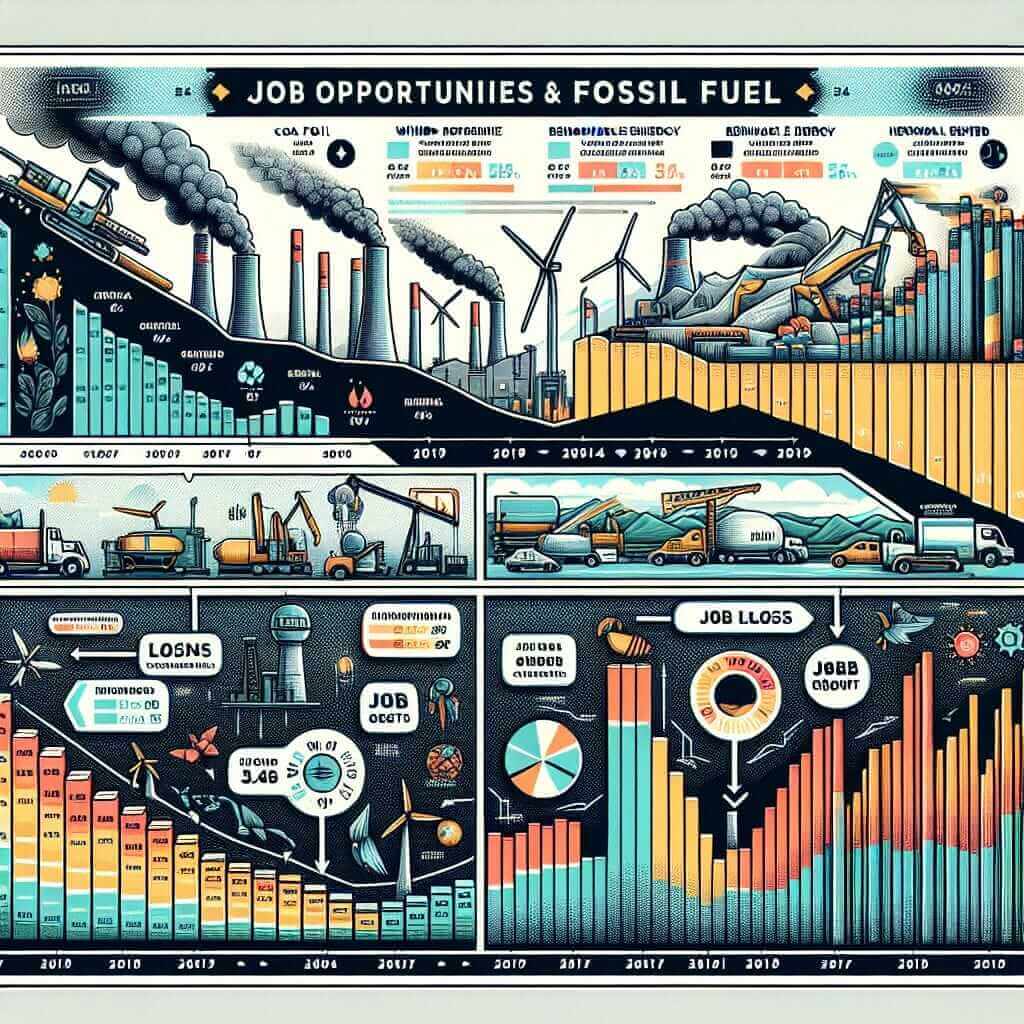The IELTS Reading Test requires candidates to comprehend passages and answer corresponding questions, demonstrating skills in skimming, scanning, and detailed reading. The topic “What are the effects of renewable energy on traditional employment sectors?” has been increasingly relevant due to the global shift towards sustainable energy sources. Understanding its potential appearance in future IELTS exams necessitates practice and awareness of its implications and associated vocabulary.
Main Content
Reading Passage
Renewable Energy and Traditional Employment Sectors
The global transition to renewable energy sources such as solar, wind, and hydropower has profound implications on traditional employment sectors. As the world strives to reduce carbon emissions and combat climate change, the renewable energy industry is experiencing exponential growth. This shift, however, raises questions about the economic and social impact on traditional fossil fuel industries and related employment sectors.
In several countries, the fossil fuel industry has been a major employer for decades, providing jobs in coal mining, oil drilling, and natural gas extraction. The transition to renewable energy threatens these jobs, creating uncertainty for workers who rely on these industries for their livelihoods. For example, coal miners in regions heavily dependent on coal have limited opportunities to transition into new roles without retraining or relocation.

Moreover, renewable energy advancements demand a different skill set compared to traditional energy sectors. Skills in technology, engineering, and sustainable energy practices are now in high demand. Governments and educational institutions must therefore play a crucial role in providing the necessary training and education to facilitate this workforce transition.
Despite the challenges, the renewable energy sector also presents significant job opportunities. The installation and maintenance of solar panels, wind turbines, and other renewable technologies require a sizable workforce. For instance, the wind industry in the U.S. has already outpaced many traditional energy industries in job creation.
Studies indicate that the net effect of renewable energy development could be positive in the long term, creating more jobs than those lost in the transition. However, this largely depends on the effectiveness of policies aiming to support affected workers and communities. Policymakers need to implement strategies to mitigate job losses and ensure new job openings in the renewable sector are accessible.
Overall, the shift from fossil fuels to renewable energy represents a significant industrial transformation with both challenges and opportunities. The future of employment in traditional energy sectors will heavily rely on how well the transition to renewable energy is managed and supported by governments, training programs, and the industries themselves.
Questions
Multiple Choice
-
What is the main driver for the growth of the renewable energy industry?
- A. The economic recession
- B. Rising oil prices
- C. The need to reduce carbon emissions
- D. Advancements in technology
-
What is a significant challenge for workers in traditional energy sectors?
- A. High educational costs
- B. Lack of technical skills for renewable energy jobs
- C. Increased competition
- D. Political instability
Identifying Information (True/False/Not Given)
-
Renewable energy advancements demand similar skills to those required in traditional energy sectors.
- True
- False
- Not Given
-
The U.S. wind industry has surpassed traditional energy sectors in job creation.
- True
- False
- Not Given
Matching Information
-
Match the following implications with their descriptions:
- __ Challenge for Traditional Workers
- __ Opportunity in Renewable Sector
- __ Policy Recommendations
- A. Installation and maintenance of renewable technologies
- B. Need for retraining and relocation
- C. Implementing strategies to mitigate job losses
Short-answer Questions
- What are the primary sources of renewable energy mentioned in the passage?
- Name one key role of governments and educational institutions in the transition to renewable energy.
Answer Keys
Multiple Choice
- C. The need to reduce carbon emissions
- B. Lack of technical skills for renewable energy jobs
Identifying Information
- False
- True
Matching Information
-
- B. Need for retraining and relocation
- A. Installation and maintenance of renewable technologies
- C. Implementing strategies to mitigate job losses
Short-answer Questions
- Solar, wind, and hydropower
- Providing necessary training and education to facilitate workforce transition
Lessons Learned
Common mistakes in such readings include misinterpreting the overall impact of renewable energy on employment and neglecting the specifics of skill requirements in the transitioning workforce. Students should pay close attention to the details provided in passages and develop the ability to distinguish between factual information and inferred implications.
Vocabulary
- Exponential (adj): steady and rapid increase
- Carbon emissions (n): the release of carbon dioxide into the atmosphere
- Retraining (n): the process of learning new skills to transition into a different job
- Workforce transition (n): the shift of workers from one industry or sector to another
Grammar Points
- Relative Clauses: “As the world strives to reduce carbon emissions and combat climate change, the renewable energy industry is experiencing exponential growth.”
- Passive Voice: “The installation and maintenance of solar panels, wind turbines, and other renewable technologies are required.”
Advice for High Reading Scores in IELTS
- Practice Regularly: Consistent reading practice helps improve speed and comprehension.
- Enhance Vocabulary: Build a robust vocabulary related to common IELTS topics.
- Develop Skimming and Scanning Skills: Quickly locate key information without reading every word.
- Answer Strategy: Understand the question types and develop strategies for each.